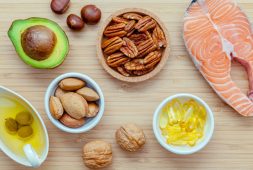
Fiber plays a vital role in maintaining our gut health, as highlighted by a recent study. Essentially, fiber acts as a source of nourishment for the beneficial bacteria residing in our gut. These bacteria, particularly Clostridium strains, ferment fiber and produce a short-chain fatty acid called butyrate. Butyrate serves as a crucial component in fortifying the walls of our gastrointestinal (GI) tract and provides protection against various conditions, including colon cancer.
The significance of butyrate becomes even more evident in the context of allergies and irritations triggered by substances like peanuts. Researchers at the University of Chicago conducted experiments using butyrate in a mouse model. They administered an oral solution of butyrate to allergic mice exposed to peanuts, effectively preventing life-threatening anaphylactic responses.
When our diet lacks sufficient fiber, the beneficial bacteria that produce butyrate can dwindle, leading to imbalances in the gut microbial community. Excessive consumption of simple sugars and carbohydrates further exacerbates this imbalance, promoting the growth of harmful microbes. This dysregulation, termed “gut dysbiosis,” can have severe consequences. Without an adequate supply of butyrate, the lining of our gut becomes vulnerable. This vulnerability can cause food particles to leak out of the GI tract and enter the bloodstream, triggering specific allergic reactions, including anaphylaxis.
Addressing these imbalances has led scientists to explore innovative solutions, including microbiome transplants, commonly known as fecal biota transplants. However, the effectiveness of these treatments has been inconsistent in laboratory settings, as noted by Dr. Jeffery Hubbell, one of the key researchers involved in the project. Therefore, maintaining a fiber-rich diet remains a fundamental approach to nurturing our gut health, sustaining the essential butyrate-producing bacteria, and safeguarding against a range of health issues, including severe allergic reactions.
“So we thought, why don’t we just deliver the metabolites like butyrate that a healthy microbiome produces?” he said in a news release made.
In early 2023, Hubbell and his team from the University of Chicago successfully conducted experiments in a mouse model. However, the solution they used had an unpleasant taste and smell. To address this issue, they developed a new configuration of polymers that conceal the butyrate.
These researchers introduced these newly developed “polymer micelles” into the digestive systems of mice lacking either a healthy gut bacteria population or a properly functioning gut lining. Through this treatment, the gut’s protective barrier and microbiome were restored. This was achieved, in part, by boosting the production of peptides that eliminate harmful bacteria. This process created space for the growth of butyrate-producing bacteria, ultimately promoting a healthier gut environment.
“We were delighted to see that our drug both replenished the levels of butyrate present in the gut and helped the population of butyrate-producing bacteria to expand,” said Cathryn Nagler, Ph.D.. She is the senior author of the study.
“That will likely have implications not only for food allergy and inflammatory bowel disease, but also for the whole set of non-communicable chronic diseases that have been rising over the last 30 years, in response to lifestyle changes and overuse of antibiotics in our society.”
Nagler and Hubbell teamed up to establish ClostraBio, a company dedicated to advancing butyrate micelles as a viable treatment for peanut allergies, as per the University of Chicago press release. They are currently collaborating with the FDA on an investigational new drug application. Their goal is to initiate clinical trials for patients with moderate ulcerative colitis within the next 18 months.



